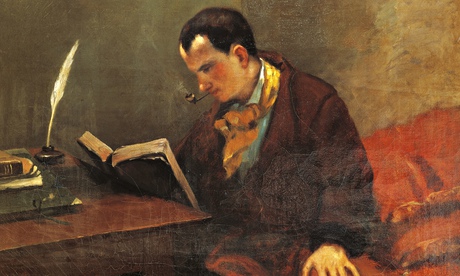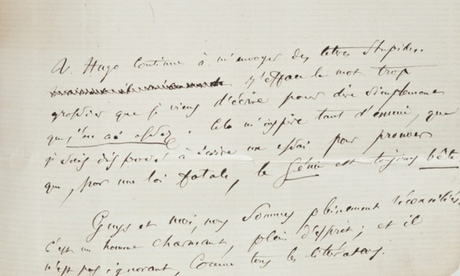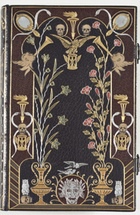我買雨果傳,是希望有機會與Grahan Robb的傳記合讀:
莫洛亞 "雨果傳:奧林匹歐或雨果的一生",杭州:浙江大學出版社,2014
Baudelaire dismissed Victor Hugo as 'an idiot' in unseen letter
In contrast to public praise of Les Misérables author, correspondence reveals private contempt

Poisonous pen … detail from portrait of Charles Baudelaire by Gustave Courbet (1847). Photograph: De Agostini/Getty Images
Victor Hugo, revered author of Les Misérables and towering French literary giant, was also something of a nuisance – at least according to his contemporary and fellow poet Charles Baudelaire.
In a January 1860 letter to an unknown correspondent, Baudelaire bemoans how Hugo "keeps on sending me stupid letters", adding that Hugo's continuing missives have inspired him "to write an essay showing that, by a fatal law, a genius is always an idiot". The letter is being auctioned by Christie's in New York, alongside a first edition of Baudelaire's celebrated poetry collection Les Fleurs du Mal, containing the six poems that were deleted from the second edition. The set is expected to fetch up to $100,000 (£60,000), according to the auction house.
 Detail from Baudelaire's letter, containing his private opinion of the 'stupid' Les Misérables author. Photograph: Christie's
Detail from Baudelaire's letter, containing his private opinion of the 'stupid' Les Misérables author. Photograph: Christie'sPublication of the first edition of Les Fleurs du Mal in 1857 was followed by Baudelaire's prosecution for "offending public morals", with the judge ordering his publisher to remove six poems from the collection. Hugo supported Baudelaire after the prosecution in August 1857, telling him that "your Fleurs du mal shine and dazzle like stars", and, in 1859, that "you give us a new kind of shudder".
Baudelaire had, in his turn, dedicated three poems in Les Fleurs du Mal to Hugo, but the Pulitzer prize-winning poet CK Williams has written of how despite this, "Baudelaire secretly despised Hugo". Rosemary Lloyd, meanwhile, writes of the "corrosive envy" of Hugo revealed by Baudelaire in his letters, in her Cambridge Companion to Baudelaire.The author, while praising Les Misérables in public in an 1862 review in Le Boulevard, described it as "immonde et inepte"– vile and inept – in a letter to his mother, adding, "I have shown, on this subject, that I possessed the art of lying".
 The first edition of Les Fleurs du Mal, tooled in gold and silver, colored inlays of flowers and symbols of death and evil, similiarly tooled. Photograph: Christie's
The first edition of Les Fleurs du Mal, tooled in gold and silver, colored inlays of flowers and symbols of death and evil, similiarly tooled. Photograph: Christie's"Baudelaire, to his chagrin and perhaps as a factor in his ultimate self-destruction, had to contend with Victor Hugo: poet, novelist, essayist, polemicist of unreal energy and fluency … literally the most famous man in the world, with his own admirable social and political projects, his own vast ego, his domination of poetry and culture," writes Williams.
Williams has it that while Hugo praised Baudelaire, he "surely underestimated the significance" of his fellow poet's work, "and never in his dreams would have imagined that for the future Baudelaire would define the aesthetics of the century that followed him, and that he, Hugo, as an influence, as a genius, would become more an item of nostalgia than a symbol of artistic power and significance".
The 1860 letter is largely about Edgar Allan Poe, whose work Baudelaire translated. The mention of Hugo – "Hugo continue a m'envoyer des lettres stupides"– is in a postscript. Christie's is auctioning the book and letter in New York, alongside an edition of Walt Whitman's Leaves of Grass, valued at up to $150,000 and printed for the author, and a $120,000 notebook of Robert Louis Stevenson's poetry and prose.
此文真能讓人了解15年的環境 Hugo's Guernsey
他花了六年裝置的屋子真的是法國味十足
《雨果傳》Victor Hugo and His World台北:新潮文庫--=《休哥傳》法國著名傳記文學作家安德烈•莫洛亞(Andre Maurois,1885—1967)
{雨果傳Victor Hugo…l'homme et l'oeuvre} 這譯本有意思:譯者送大家他珍藏的十來張雨果相關的紀念明信片。
「雨果傳」,台灣和中國大陸都翻譯過A Maurois的Victor Hugo and His World,不過問題太多了。舉台灣新潮本的第 57頁末行,譯者其實要幫忙注解它舉的Rivoli 和Friedland,都是拿破崙戰爭的著名戰場/地。
這種史地問題對我們造成很大的障礙:這在{萊茵河 }等,更是困難太多啦!---
約伯傳(思高聖經)
"Tomorrow, if all literature was to be destroyed and it was left to
me to retain one work only, I should save Job." (Victor Hugo)
有一個人問一位文學家,我記得是雨果罷,「如果世界上的書全需要燒掉,而只許留一本,應留什麼?」雨果毫不猶豫的說:「只留〈約伯記〉。」約伯是《聖經》裏面的介之推,富亦謝天,貧亦謝天,病亦謝天,苦亦謝天。 (陳之籓 《在春風裏 謝天》1961
陳之藩先生引 Hugo 的話固然沒錯
然而Hugo 是通人 他在誤導人的書名 《莎士比亞》一書中談了許多了不起的 無法比較的傑作作家.........
In VICTOR HUGO Graham Robb examines two major aspects of Hugo’s life: his amorous adventures and his gradual transformation from a political conservative who supported the monarchy into a social activist who defended democratic values. Robb’s stress on the adulterous affairs of both Victor Hugo and his wife Adele is perhaps misplaced, but it does demonstrate that the Hugo family was quite dysfunctional. Juliette Drouet was Victor Hugo’s mistress from 1833 until 1883, but Victor and his wife maintained for decades the public facade of a loving and happy couple. Near the end of his life, Victor Hugo even published a very sentimental book about being a grandfather. Robb shows that he was a devoted grandfather only in this work of personal mythmaking.
Robb’s analysis of Victor Hugo’s political evolution is fascinating. Victor Hugo’s father had been a general in the army of Napoleon I. Perhaps as a reaction to his father’s abdication of his paternal responsibilities, Hugo rejected the First Empire and became a fervent supporter of the monarchy. By the end of the 1840’s, however, he changed his political beliefs and became the most eloquent voice of opposition to the dictatorship of Napoleon III during the 1850’s and 1860’s. During the almost two decades of his political exile, Hugo became a profound social critic and composed his masterpiece LES MISERABLES (1862).
This superb biography also includes a thirty-page bibliography to help readers discover for themselves the rich complexity of Victor Hugo’s life and works.
****
"In His Nightmare City"The New York Review of Books 54/11 (28 June 2007) : 52-54 [reviews Mario Vargas Llosa, The Temptation of the Impossible: Victor Hugo and Les Misérables, translated from the Spanish by John King]